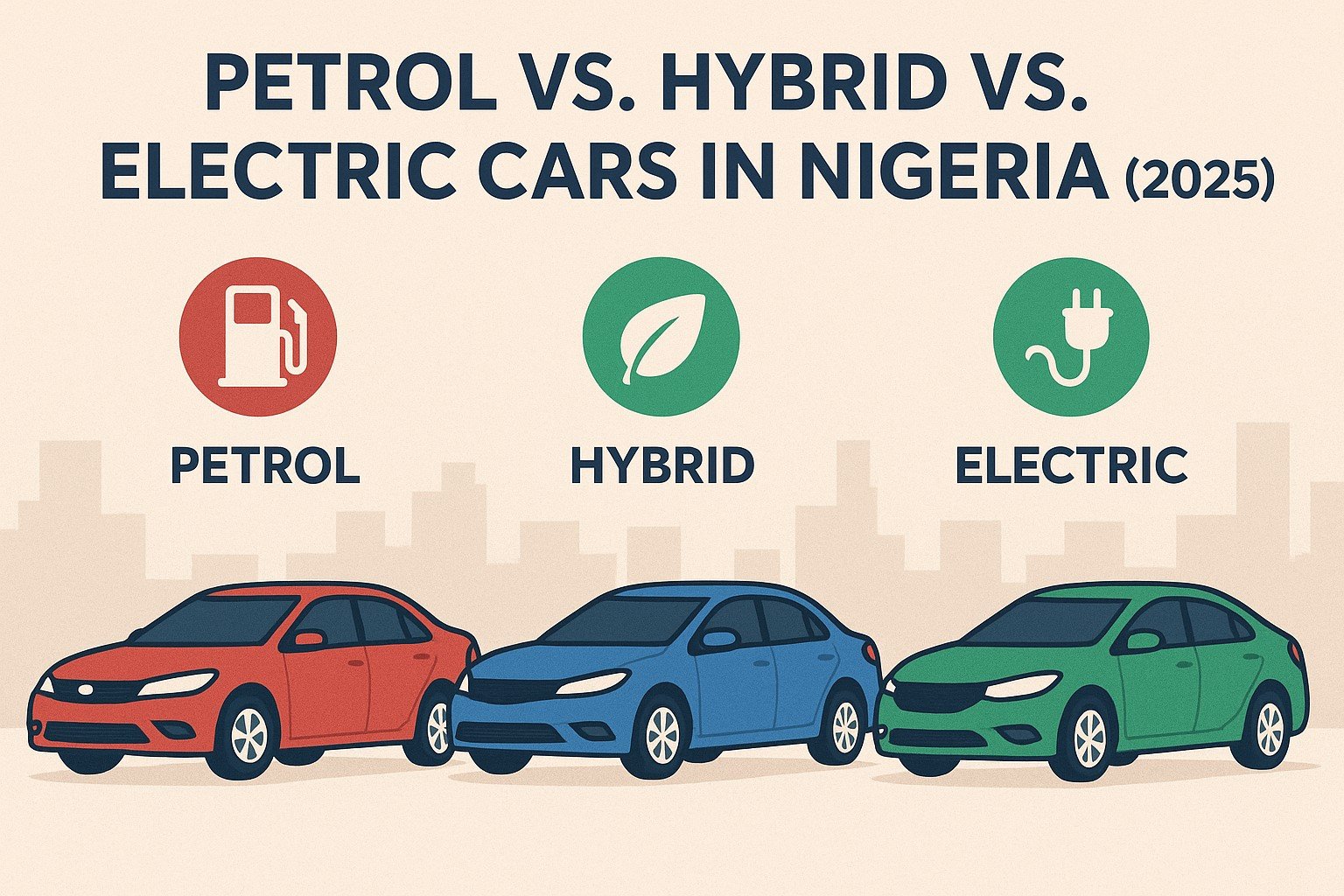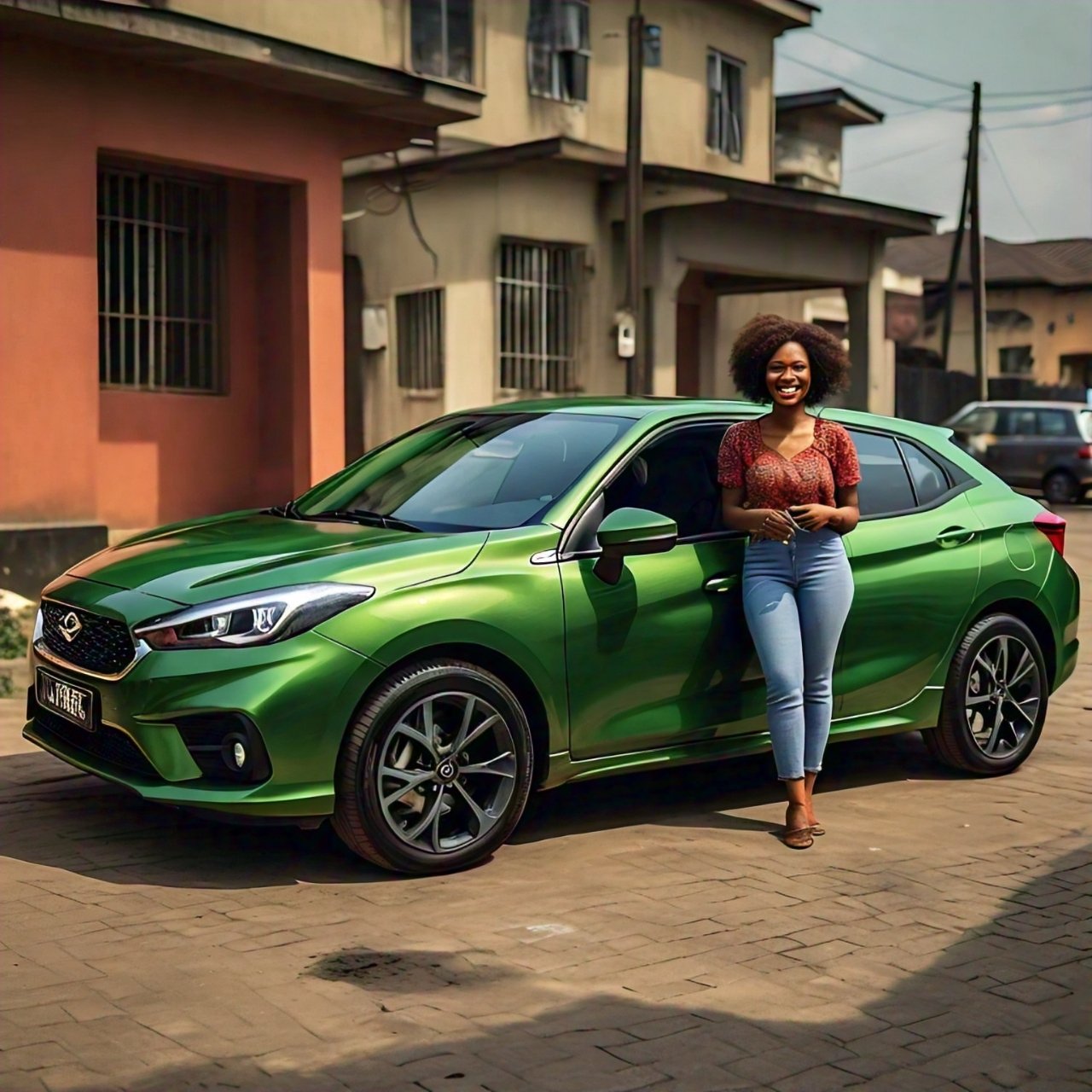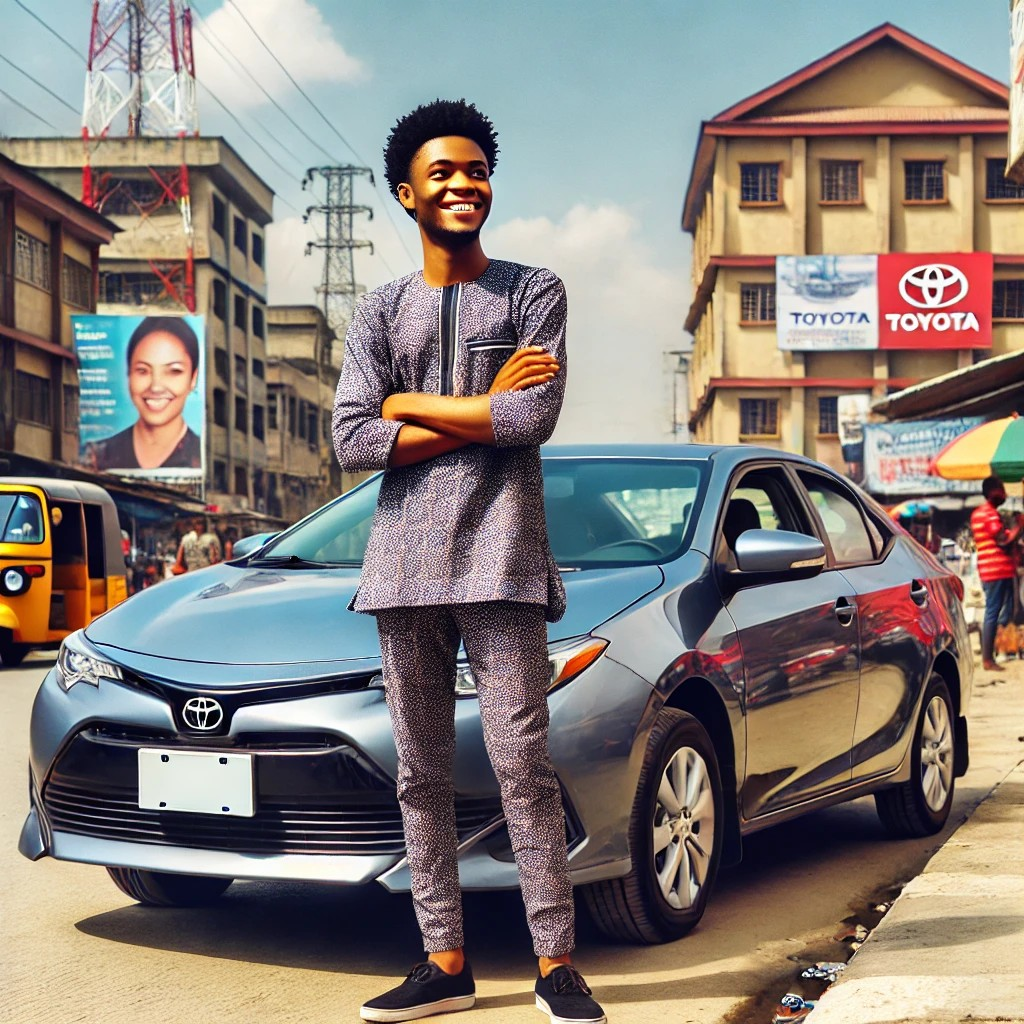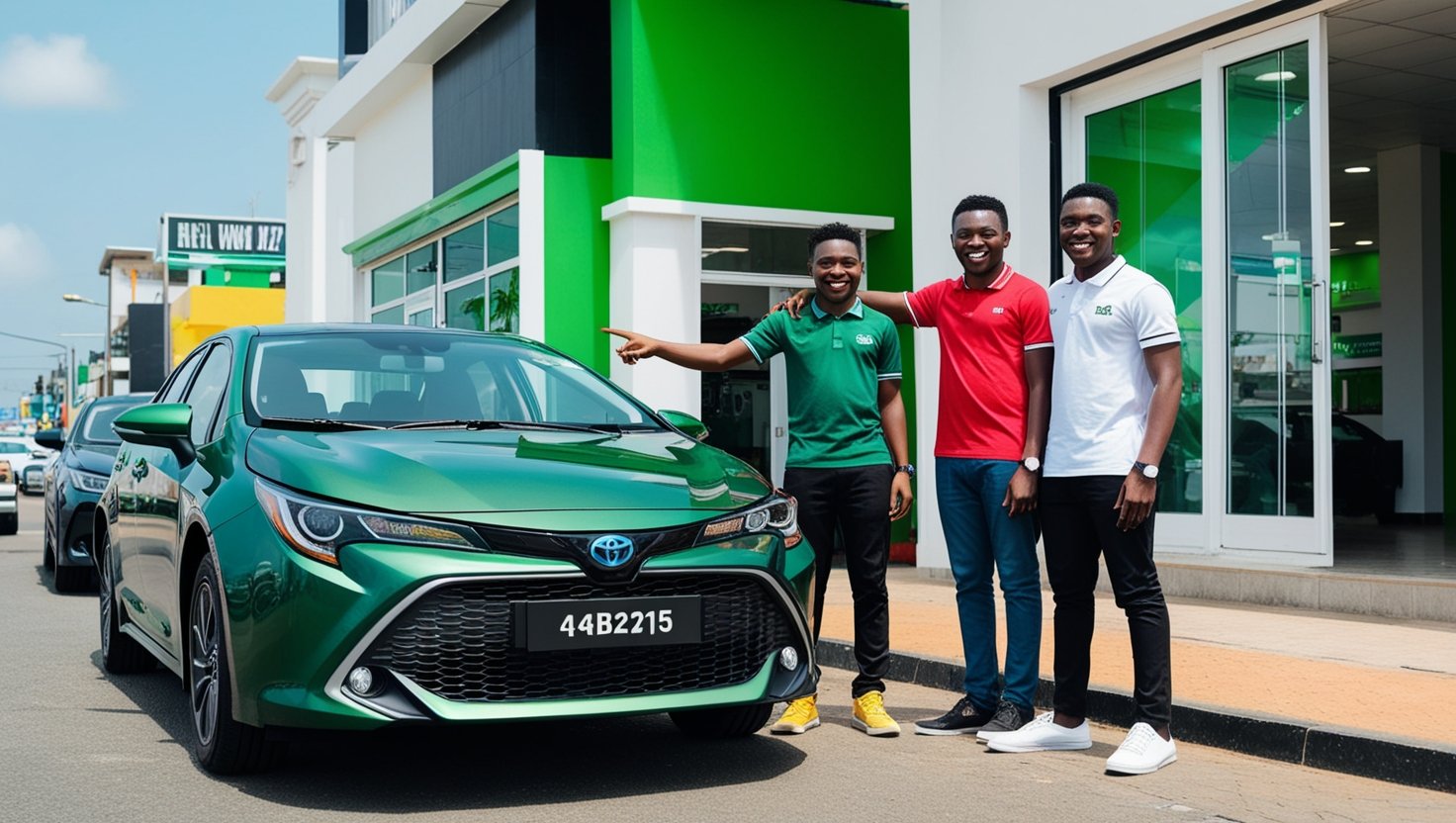The Nigerian auto market is evolving fast. With rising fuel prices, growing concerns about the environment, and global shifts toward electric mobility, many first-time and seasoned car buyers are asking: Should I go petrol, hybrid, or fully electric in 2025?
This guide unpacks the pros, cons, and real-world practicality of each option – petrol, hybrid, and electric vehicles (EVs) especially for Nigerian roads, fuel supply realities, maintenance challenges, and daily commuting.
Whether you are buying your first car or looking to switch, here’s the breakdown you need!
- Understanding the Basics: What Sets Petrol, Hybrid, and EVs Apart
- Initial Purchase Cost Comparison
- Fuel Economy and Daily Running Costs
- Maintenance and Repair Costs in Nigeria
- Environmental Impact and Emissions
- Availability, Infrastructure, and Support
- Resale Value and Long-Term Ownership
- Which One is Best for You in Nigeria (2025)?
- Conclusion
Understanding the Basics: What Sets Petrol, Hybrid, and EVs Apart
I remember the first time I heard about hybrid cars. I honestly thought it was some transformer-type ride that flipped between fuel and electric mode like magic. Turns out, it’s not far off, just less dramatic.
Let’s break it down in simple terms. Petrol cars are what most of us are used to. You fill them with fuel, they burn that fuel in an internal combustion engine (ICE), and off you go. Think Toyota Corolla or Honda Accord. Easy. Familiar. But also not the most fuel-efficient with today’s crazy petrol prices in Nigeria.
Now, hybrids? Those are the in-betweens. They have both a petrol engine and an electric motor. When you are crawling through Lagos traffic or idling in Abuja, the electric motor might handle things. Then once you hit express speeds, the petrol engine kicks in. It saves fuel and reduces emissions which equals double win. Camry Hybrid is a good example. You won’t need to plug it in either, unlike full electric cars.
Electric vehicles (EVs) ditch the engine entirely. No petrol, no exhaust, just batteries and electric motors. You charge them like your phone, and some can even run up to 400 km on a full charge (Hyundai Kona EV, for example). Super quiet, low maintenance, but the charging station network in Nigeria? Still growing, slowly.
Pro Tip: If you mostly drive short distances and can access charging (like at work or home), EVs are fantastic. But for cross-state travel? You’ll need a backup plan.
For most people in Nigeria, the challenge isn’t just understanding how petrol, hybrid, and electric cars work, it’s figuring out which one actually makes sense for their budget and lifestyle.
At Godlovesme Trending Cars (GTC), we walk clients through this decision step by step, looking at fuel costs, charging access, resale value, and even import duties. That way, you don’t just buy a car, you buy peace of mind. If you are thinking about switching to hybrid or electric, talk to us first.
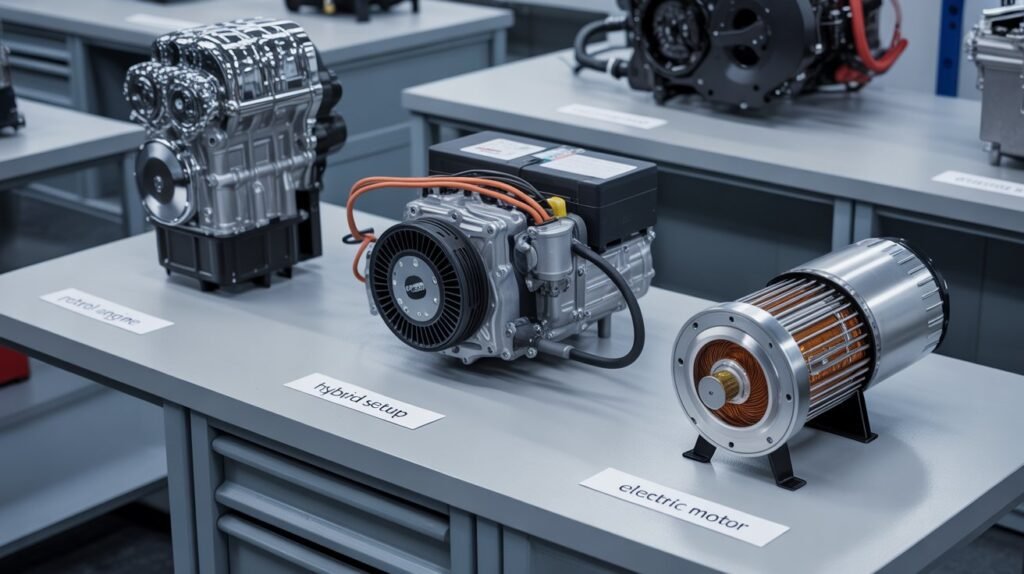
Initial Purchase Cost Comparison
Let’s talk money because the type of engine under the hood means very different things for your wallet. When I was shopping for a second car last year, I priced a Corolla (petrol), a Camry Hybrid, and the Kona EV. Let’s just say the difference in cost nearly made me spill my zobo.
Brand-new petrol cars in Nigeria still hold the crown for affordability. You can grab a Toyota Corolla (brand new) for anywhere between ₦22M to ₦40M depending on the trim and dealer. Now compare that to the Camry Hybrid, which can set you back around ₦35M to ₦65M. The tech alone jacks up the price.
And the Hyundai Kona EV? That baby starts at around ₦38M to ₦75M for a brand-new unit. But the kicker is that there is no fuel cost, no oil change, fewer moving parts. So, while the upfront cost stings, it may pay off in the long run.
Tokunbo (foreign used) gives some breathing room. A used Corolla (2015–2018) may go for ₦6M to ₦12M, a Camry Hybrid might cost around ₦10M to ₦18M depending on condition. Kona EVs are still rare in tokunbo form, but some used units show up for ₦20M+.
And here is something wild, Nigeria applies different import duties: regular petrol cars have about 70% duty, but EVs benefit from a duty reduction (as low as 5% in some cases) thanks to recent government incentives. Hybrids? They are stuck somewhere in the middle. So, if you are buying new and want to save on import costs, EVs may surprise you.
Advice: Always ask your dealer or clearing agent for the latest duty breakdowns. Policies are shifting, and what’s true this month may change next quarter.
Fuel Economy and Daily Running Costs
Let’s not sugarcoat it — petrol in Nigeria isn’t what it used to be. I remember when ₦2000 could fill up my tank halfway. Now? That same ₦2000 might not even get me from Surulere to Lekki. With deregulation and fuel prices shooting past ₦700 per litre in many places, fuel economy has become a real deciding factor for most car buyers.
Petrol cars still rule the streets, and they are simple to maintain. But if you are driving daily e.g. school runs, work, market runs, fuel costs pile up fast. My Corolla gulps about ₦20,000 worth of fuel weekly on a modest commute. Multiply that by four weeks, and you are looking at a serious budget.
Hybrids, though? Total game changer. A friend of mine drives a Camry Hybrid from 2016, and he swears it cuts his fuel bill in half. The electric motor handles traffic crawling, which is most of what Lagos driving is anyway. He says he buys fuel every two weeks instead of every few days. That’s easily a ₦40K–₦60K monthly savings.
EVs are in a league of their own. No fuel, just charging. Sounds amazing, right? But… here’s the catch: NEPA. If you have reliable power (or solar or inverter setups), charging is cost-efficient. A full charge on a Kona EV costs roughly ₦15,000–₦25,000 in electricity depending on the Band and can take you 300–400km. But if you are relying on a generator? Hmm… Bruh, you might as well drive a petrol car instead.
Real Talk Tip: If you have steady power at home or work, EVs are perfect for daily drivers in cities like Abuja or VI. But if you are in areas with unreliable light, hybrids are your safest bet for fuel economy without range anxiety.
Maintenance and Repair Costs in Nigeria
One of the first things I ask when I see a new car model on the road is: “If it spoils, who go fix am?” Because in Nigeria, a car is only as good as the mechanic down your street.
Petrol cars? No stress. Every mechanic from Enugu to Ikeja knows how to handle a Toyota or Honda engine. Parts are everywhere — Ladipo, Aba, even online. My Corolla once had a leaking radiator; I got a tokunbo replacement the same day for ₦35K. That kind of convenience matters.
Hybrid cars are a bit trickier. While basic servicing like oil changes are straightforward, once you have battery issues or electric motor faults? You’ll need a specialist. Hybrid batteries can last 8–10 years, but replacing one could cost over ₦600K. I once helped a friend source one for a 2012 Camry Hybrid — the search alone took three weeks. Luckily, more technicians are getting trained, but it’s still a niche.
Now for EVs — this one’s delicate. The good news? Fewer moving parts mean fewer breakdowns. No oil changes, no exhaust repairs, no gearbox drama. The bad news? If something does go wrong especially battery related, options are very limited. Most Nigerian mechanics aren’t familiar with EV architecture yet. I’ve heard of EV owners having to fly in parts and technicians. That’s serious dough.
Advice from Experience: If you are buying a hybrid or EV, make sure your area has at least one trusted technician that understands the system. And always ask for the previous battery history, especially for tokunbo models.
Pro tip: Don’t just compare the purchase price of a car, instead, compare the total cost of ownership. For example, a petrol car may be cheaper upfront, but a hybrid could save you thousands in fuel over the years. This is exactly the kind of calculation we run for clients at GTC. Before you commit, book a session with us and let’s crunch the numbers together.
Environmental Impact and Emissions
Back when I used to think about cars, I never really considered the environment. I just wanted something reliable that would not leave me stranded on 3rd Mainland Bridge. But after having kids, the way I look at “emissions” completely changed. Especially when you see the kind of soot you inhale just sitting in Lagos traffic for 30 minutes.
Petrol cars? They are the real culprits. A typical petrol engine releases between 120–200 grams of CO₂ per kilometer. That’s not even counting the black smoke you see from some old cars on the road. Multiply that across thousands of vehicles, and you have gotten yourself a breathing hazard. No wonder our dry season haze feels like smoking a packet of cigarettes.
Hybrids do better. Because the electric motor takes over during idle or slow traffic, they emit about 20–35% less CO₂ compared to regular petrol cars. My cousin’s Accord Hybrid practically glides through traffic on electric mode, especially during those stop-and-go movements on Lekki-Epe Express. It’s not zero-emission, but it’s a lot less guilt when you are crawling through VI every morning.
Now, electric vehicles, in theory, they are the cleanest. No tailpipe emissions. Nothing. But the bigger question is: where’s the electricity coming from? In Nigeria, most of our power grid still relies on gas and diesel generation. So, while an EV doesn’t pollute directly, it’s still part of a “dirty” chain if you are charging from NEPA or gen.
But here’s the catch, if you are charging from solar or inverter-based systems, now we are talking true green mobility. And trust me, a lot of smart folks in Abuja and parts of Lekki are already doing that. There’s a slow but steady shift, and people are beginning to care more about sustainability. Not just for the planet, but for their health too.
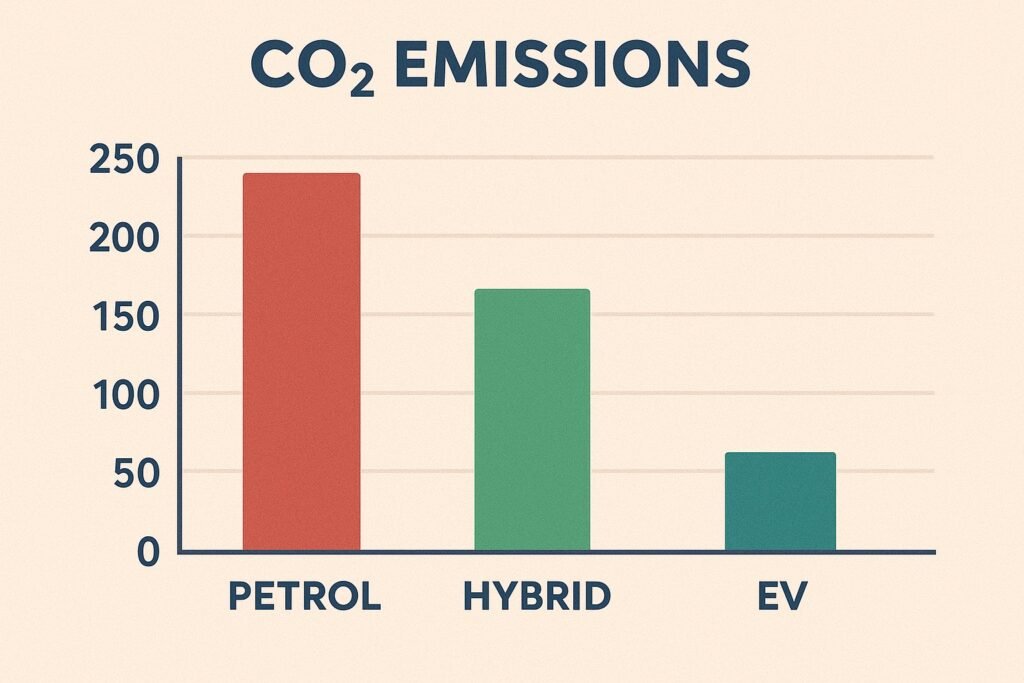
Availability, Infrastructure, and Support
Alright, let’s get real, owning a car in Nigeria isn’t just about the brand or price. It’s about access. If you can’t fuel it, fix it, or charge it, then it’s basically a statue in your compound.
Petrol cars? Still king when it comes to availability. Fuel stations are literally everywhere even my grandma’s village in Kogi has one. Whether you are in Lagos, Jos, or Sokoto, you will find a station within 5km radius. And if you break down? There is always a mechanic willing to try.
Now, EVs? That’s where the struggle is real. Lagos has started seeing public charging stations pop up; I know of a few in VI, Lekki Phase 1, and one around Ikeja GRA. Abuja too has a couple of pilot stations. But outside of those zones? You are on your own. Most EV owners either charge at home with an inverter system or map their trips carefully. Imagine planning your day around battery percentage like you are using a Nokia Torchlight.
Hybrid cars have the middle ground. They still use fuel, so you have station access. But if that hybrid battery acts up? Not every workshop can help. You will need to know someone who knows someone and sometimes, wait weeks for a part from Dubai or the US.
In terms of dealer support, petrol cars again have the widest network. Brands like Toyota and Honda have decades of footprint in Nigeria when it comes to certified dealerships, mobile mechanics, auto spare part, etc. GAC and Hyundai have growing networks, but they are still catching up.
EV support is still young. Some brands like Jet Motors and Hyundai offer servicing, but they are only in major cities.
Resale Value and Long-Term Ownership
So let me tell you something I learned the hard way: cars in Nigeria are not just a ride, they are an investment. Or at least, they should be. The day I helped a client sell their hybrid Camry was the day I realized resale value is not created equal.
Let’s start with petrol cars. They are still the kings of resale in Nigeria. A well-maintained Toyota Corolla or Camry? That thing will fly off your hands faster than suya on a Friday night. Why? Parts are relatively cheap, mechanics know them inside out, and there is this ingrained trust that they will keep running even if the roads don’t. Tokunbo petrol cars dominate our second-hand market, people love them because they are predictable.
Hybrids? Ehh, tricky. If you find the right buyer, one who understands the fuel savings and isn’t scared off by the hybrid battery, you might get a decent resale price. But the market is smaller. Nigerians are still warming up to the tech. I had to wait nearly four months and slash my price before I sold that Camry Hybrid. People kept asking if the battery would “spoil” or if it needed NEPA to run (spoiler: it doesn’t).
Now EVs… This one is for the brave. EVs in Nigeria still don’t have much resale traction. The demand is low, and most buyers are not ready to gamble on electricity and charging logistics. Unless you are in a techy circle or targeting someone deep into sustainability, it might sit on the market a while.
If you are thinking long-term ownership, petrol cars still give you the most stress-free life. Especially with access to parts, bush mechanics, and the fact that everyone from your cousin to your gateman knows how to fix one. But if you are future-focused and planning to stick with your car for 7+ years, hybrids and EVs can save you on fuel and give you peace of mind (assuming you are charging smart).
Which One is Best for You in Nigeria (2025)?
Okay, real talk, when people ask me what type of car they should buy, I always say it depends on your life. Not just your budget, but your location, power supply, road conditions, even who is going to be driving it most of the time.
If you are mostly doing city driving in traffic-heavy areas like Lekki, Ikeja, or Port Harcourt, hybrid cars are an amazing choice. That stop-and-go movement is where hybrids shine. They switch to electric mode at low speeds, so you will burn less fuel and save a lot over time. Plus, they are quiet, which is such a vibe when you are crawling in bumper-to-bumper traffic with your music on.
Long-distance or interstate travel? Stick with petrol. The fuel stations are everywhere, the roads are unpredictable, and if something goes wrong, there’s always a roadside mechanic who can at least try to fix it. My Corolla handled Abuja to Kaduna like a champ, and if not for a minor puncture in Lokoja, it would have been perfect. EVs still can’t compete on long-distance drives unless you are hauling your own charging station along, which… good luck.
Now, if you are tech-savvy, live in a power-stable area (hello, parts of Abuja or Lekki with solar setups), and want something future-forward, an EV might actually work for you. But you would need to build your life around it like charging overnight, knowing your range, and planning trips like a pilot.
Also, road conditions matter. Most EVs and hybrids are low-clearance. Nigeria’s roads? Not always forgiving. If you live in a flood-prone area or anywhere with “off-road tendencies,” you need ground clearance. A petrol SUV or pickup might just be your best friend.
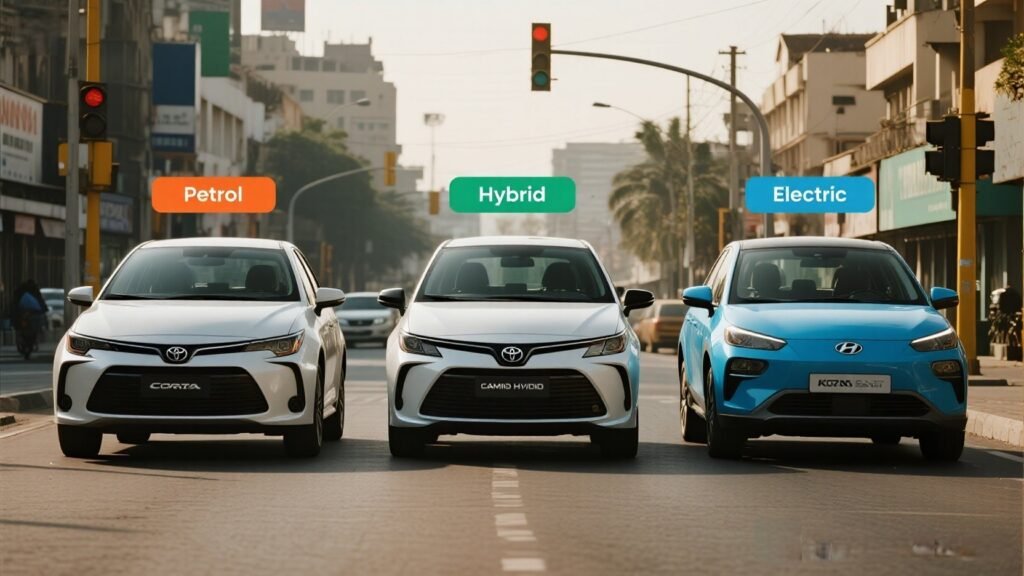
Conclusion
Petrol, hybrid, or electric? In 2025 Nigeria, each car type has its clear strengths and challenges. Petrol cars remain the most accessible. Hybrids offer a middle ground for fuel savings without full EV dependence. Electric vehicles are the future but only if you are ready to deal with charging logistics.
The truth is, there is no one-size-fits-all answer. The right choice depends on your budget, your driving habits, and your long-term plans. That’s where we come in. At GTC, we have helped first-time buyers and experienced car owners alike find the perfect fit. Ready to choose your next car with confidence? Reach out to us today via our contact page.

